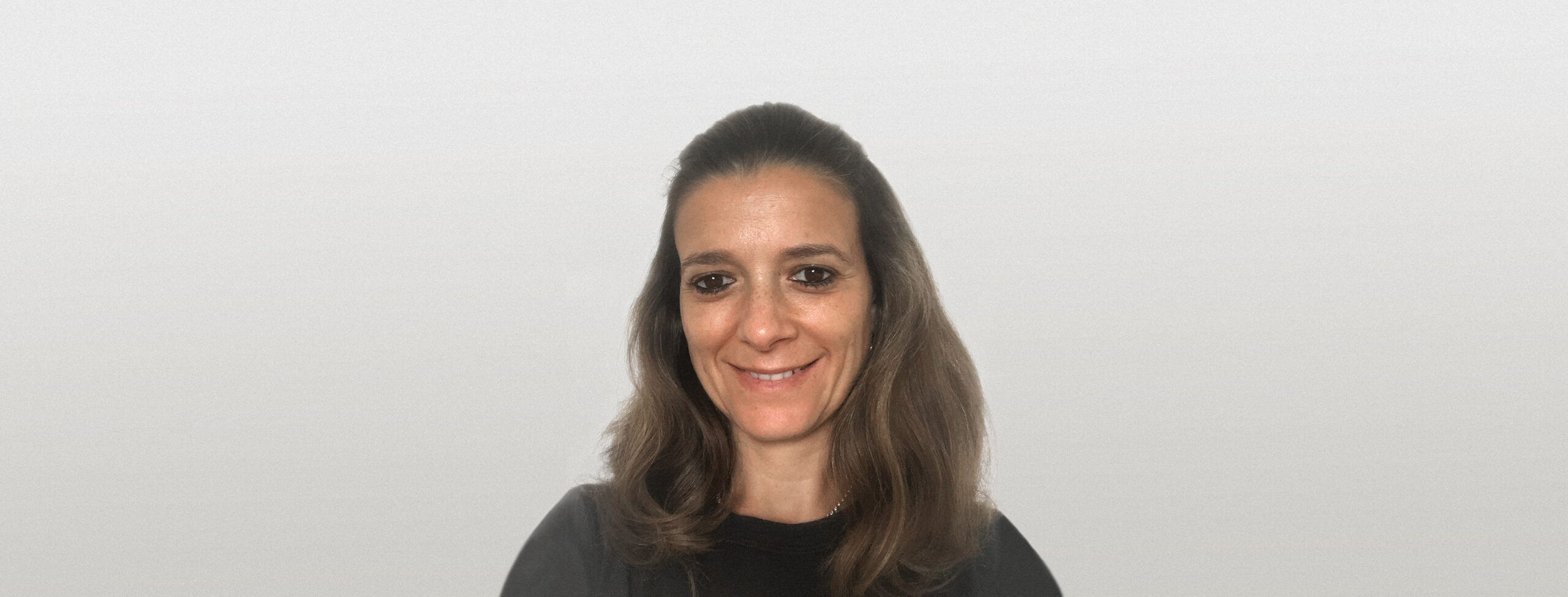Dr. Ana Maria Abreu

Associate Professor of Psychology
Dr. Ana Maria Abreu has BSc in Psychology from ISPA, a DEA in Neuropsychology from Sorbonne University, and a PhD in Brain, Behavior, and Cognition from Sorbonne University and Kings College London. She completed three post-doc positions at Sapienza University of Rome, Universidade Católica Portuguesa (UCP), and the Faculty of Human Kinetics, respectively.
Before joining Forward, she coordinated a BSc in Psychology (Europeia University), co-coordinated a PhD program in Cognition and Language Sciences, and directed the Neuroscience for Innovation in Communication and Education Lab (UCP). Her main research interests concern the impact of ICTs on cognitive, mental, and social health; the impact of exercise on cognition; and the perceptive and communication profile of children with autism spectrum disorders. Ana Maria is a full research member of the Centre for Interdisciplinary Research in Health (CIIS – UCP). She has supervised six graduate students to completion and is supervising several PhD and MSc students. She has published more than 50 research works (including scientific articles in journals, chapters, and one book edition). She is an Ad Hoc reviewer for more than 20 national and international scientific journals and is a member of the editorial board of four peer-reviewed scientific journals. Ana Maria loves rollerblading with her family, painting, and writing poetry and prose.
Teaching
- Biological Psychology (PL1030)
- Social Psychology (PL1035)
- Applications of Psychology (PL1015)
- Developmental Psychology (PL1020)
Select Publications
Books
Abreu, A.M., & Rato, J. (2018). NeuroPsicologia do desporto e do movimento humano: O que te faltava saber! Climepsi Editores.
Peer Reviewed Articles and Book Chapters
Moita, M., Abreu, A.M., & Mineiro, A. (2023). Iconicity in the Emergence of a Phonological System? Journal of Language Evolution. https://doi.org/10.1093/jole/lzad009
Abreu, A.M. (2023). The effects of ICT pervasiveness on cognition and the brain:
An opinion paper. In A. Mineiro, A. Almeida, M. Vieira & M. Barros (Eds.), On the verge of neurosciences: Challenges in brain sciences today (pp. 109-125). UCP Editora.
Raposo M.M., Abreu A.M., Dionísio L.L., Leite, T. & Castro-Caldas, A. (2023). Music therapy assessment with the IMCAP-ND: A pilot study. Voices: A World Forum for Music Therapy, 23(1). https://doi.org/10.15845/voices.v23i1.3423
Coelho, F. & Abreu, A.M. (2023). The corporate (Magic) Circle: Fun work or controlled play? TechTrends, 67, 160-177.https://doi.org/10.1007/s11528-022-00776-z
Abreu, A.M. (2022). Lazer e exercício físico na promoção da saúde mental na era digital. In T. Santos & M. Nery (Eds.), Psicologia clínica e da saúde: Da teoria à intervenção (pp. 175-188). Edições Sílabo.
Maeneja, R., Ferreira, I.S., Ribeiro da Silva, C., & Abreu, A.M. (2022). Cognitive benefits of exercise: Is there a time-of-day effect? Healthcare, 10(9), 1766. https://doi.org/10.3390/healthcare10091766
Gonçalves, M. & Abreu, A.M. (2022). Sensory processing, and occupational participation. Journal of Occupational Therapy, Schools, & Early Intervention. https://doi.org/10.1080/19411243.2022.2112362
Rando, B., Abreu, A.M., & Blanca, M.J. (2022). New evidence on the psychometric properties of the Portuguese version of the flourishing scale: Measurement invariance across gender. Current Psychology. https://doi.org/10.1007/s12144-022-03325-2
Rodrigues, F.M., Abreu, A.M., Holmström, I., & Mineiro, A. (2022). Digital migration and consolidation of inequality for the Deaf and Hard of Hearing. Scientific Reports, 12, 9346. https://doi.org/10.1038/s41598-022-13542-1
Abreu, A.M., Mineiro, A., Ribeiro da Silva, C., & Castro-Caldas, A. (2022). Space, movement, and articulation in a newly emerging sign language: Contributions for neural and sociocognitive efficiency in communication. International Journal of Psychology and Neuroscience, 8(1), 1-18. https://drive.google.com/file/d/1qXVYM_In-41U7_wAeD5Fg4_2XrbRXGP9/view
Abreu, A.M., Monteiro, C.P., & Rando, B. (2022) The impact of action observation on the intention for action engagement. International Journal of Exercise and Sport Psychology, 10(9). https://doi.org/10.1080/1612197X.2022.2066707
Garcia-Castro F.J., Abreu, A.M., Rando B., & Blanca M.J. (2022). The Phubbing Scale (PS-8) in the Portuguese population: Psychometric properties. Psychology: Research & Review, 35(7). https://doi.org/10.1186/s41155-022-00209-z
Mendonça, I., Coelho, F., Ferrajão, P., & Abreu, A.M. (2022). Telework and mental health during COVID-19. International Journal of Environmental Research and Public Health, 19(5), 2602. https://doi.org/10.3390/ijerph190526
Błachnio, A., Przepiórka, A., Gorbaniuk, O., McNeill, M., Bendayan, R., Durak, M., Durak, E.S., Ben-Ezra, M., Benvenuti, M., Angeluci, A., Abreu, A.M., Blanca, M.J., Brkljacic, T., Babič, N.C., Gorbaniuk, J., Holdos, J., Ivanova, A., Malik, S., Mazzoni, E., Milanovic, A., Musil, B., Pantic, I., Rando, B., Seidman, G., D’Souza, L., Vanden Abeele, M.M.P., Wołońciej, M., Wu, A.M.S., & Yu, S. Country indicators moderating the relationship between phubbing and psychological distress: A comparative study between 20 countries. (2021). Frontiers in Psychology, 12, 5544. https://doi.org/10.3389/fpsyg.2021.588174
Franco, S., Abreu, A.M., Biscaia, R., & Gama, S. (2021). Sports ingroup love does not make me like the sponsor’s beverage but gets me buying it. PLoS One, 6(7), e0254940. https://doi.org/10.1371/journal.pone.0254940
Błachnio, A., Przepiórka, A., Gorbaniuk, O., Bendayan, R., McNeill, M., Angeluci, A., Abreu, A.M., Ben-Ezra, M., Benvenuti, M., Blanca, M.J., Brkljacic, T., Čuš Babić, N., Gorbaniuk, J., Holdoš, J., Ivanova, A., Karadağ, E., Malik, S., Mazzoni, E., Milanovic, A., Musil, B., Pantic, I., Rando, B., Seidman, G., D’Souza, L., Vanden, Abeele, M., Wołonciej, M., Wu, A., & Yu, S. (2021). Measurement invariance of the Phubbing Scale across 20 countries. International Journal of Psychology, 56(6), 885-894. https://doi.org/10.1002/ijop.12790
Martinez, L., Rando, B., Agante, L., & Abreu, A.M. (2021). True colors: Consumers’ packaging choices depend on the color of retail environment. Journal of Retailing and Consumer Services, 59, 102372. https://doi.org/10.1016/j.jretconser.2020.102372
Martinez, L.M., Gameiro, D., Martinez, L.F., Agante, L., & Abreu, A.M. (2020). The influence of color in anthropomorphic packaging: Purchase intention and product attractiveness. Portuguese Journal of Marketing, 19(37), 71-86.
Abreu, A.M., & Frade, I. (2020). Running against the schedule: Are children exercising at the right time? A comment on the Portuguese Education System. Cadernos de Saúde, 12(2), 33-40. https://doi.org/10.34632/cadernosdesaude.2020.9544
Maeneja, R., & Abreu, A.M. (2020). The Ubiquity of ICTs: Mental health risks reinforced by the COVID-19 crisis. Psicologia, Saúde & Doenças, 21(3), 571-581. http://dx.doi.org/10.15309/20psd210303
Blachnio, A., Przepiorka, A., Gorbaniuk, O., Ivanova, A., Angeluci A., Abreu A.M., … & Babic, N.C. (2020, April). The consequences of Facebook Intrusion for personal well-being: The mediation role of distress and social functioning. In Personality and Individual Differences (Vol. 157). Pergamon-Elsevier Science Ltd.
Ozkan, D.G., Pezzetta, R., Moreau, Q., Abreu, A.M., & Aglioti, S.M. (2019). Predicting the fate of basketball throws: An EEG study on expert action prediction in wheelchair basketball players. Experimental Brain Research, 237(12), 3363-3373. http://dx.doi.org/10.1007/s00221-019-05677-x.
Abreu, A.M., Esteves, P.T., & Aglioti, S.M. (2019). Action understanding, motor resonance, and embodied simulation in sports: Bridging ecological and neuroscientific approaches. In ML Cappuccio (Ed.), MIT Press Handbook of Embodied Cognition and Sport Psychology (pp. 359-379). Boston: MIT Press.
Abreu, AM, & Rato, J. (2018). As novas tendências de investigação para perceberes o desporto e o movimento humano. In A.M. Abreu, & J. Rato, (Eds.), NeuroPsicologia do desporto e do movimento humano: O que te faltava saber! (pp. 1-36). Climepsi Editores.
Sacavém, A., Martinez, L.F., Cunha, J.V., Abreu, A.M., & Johnson, S.K. (2017). Charismatic leadership: A study on delivery styles and performance. Journal of Leadership Studies, 11(3), 21-38. http://dx.doi.org/10.1002/jls.21519
Abreu, A.M., Candidi, M., & Aglioti, SM (2017). Catching on it early: Bodily and brain anticipatory mechanisms for excellence in Sport. In V. Walsh, M. Wilson, & B. Parkin (Eds.), Progress in Brain Research Book Series – Sport and the brain: The science of preparing, enduring and winning – Part B, Volume 234 (pp. 53-67). Amsterdam: Academic Press. http://dx.doi.org/10.1016/bs.pbr.2017.08.006.
Barreiros, A., & Abreu, A.M. (2017). Sports expertise: Is Nature or nurture to blame? No, it’s the brain! Revista Iberoamericana de Psicología del Ejercicio y el Deporte – RIPED, 12(2), 307-312.
Abreu, A.M., de Schonen, S., Soares, J., & Happé, F. (2016). Motion perception and social cognition in Autism: Speed selective impairments in socio-conceptual processing. Journal of Advanced Neuroscience Research, 3(2), 45-53. http://dx.doi.org/10.15379/2409-3564.2016.03.02.02
Abreu, A.M., & Duarte, R. (2015). Expertise in sports: Reconciling sports sciences with findings from experimental and social psychology and neuroscience. Annals of Sports Medicine and Research, 2(3), 1020.
Pereira, T., Castro-Caldas, A., & Abreu, A.M. (2014). Age-related gender differences in motor and inhibitory learning and consolidation. Journal of Advanced Neuroscience Research, 1(1), 10-21. http://dx.doi.org/10.15379/2409-3564.2014.01.01.2
Abreu, A.M. (2014). Action anticipation in sports: A particular case of expert decision-making. Trends in Sport Sciences, 1(21), 197-203.
Abreu, A.M., & Esteves, P.T. (2014). Neuroscientific bases of decision-making in Sport. In F. Del Villar Álvarez & L. García-González (Eds.), El entrenamiento tactico y decisional en el deporte. (pp. 59-79). Synthesis.
Oliveira, P., Araújo, D., & Abreu, A.M. (2014). Proneness for exercise, cognitive and psychophysiological consequences of action observation. Psychology of Sport and Exercise, 15(1), 39-47.https://dx.doi.org/10.1016/j.psychsport.2013.09.008
Rato, J., Abreu, A.M., & Castro-Caldas, A. (2013). Neuromyths in education: What is fact and what is fiction for Portuguese teachers? Educational Research, 55(4), 441-453. https://doi.org/10.1080/00131881.2013.844947
Pereira, T., Abreu, A.M., & Castro-Caldas, A. (2013). Understanding task- and expertise-specific motor acquisition and motor memory formation and consolidation. Perceptual and Motor Skills, 117(1), 108-129. https://doi.org/10.2466/23.25.pms.117x14z0
Abreu, A.M., Macaluso, E., Azevedo, R., Cesari, P., Urgesi, C., & Aglioti, S.M. (2012). Action anticipation beyond the action observation network: An fMRI study in expert basketball players. European Journal of Neuroscience, 35(10), 1646-1654. https://doi.org/10.1111/j.1460-9568.2012.08104.x
Rato, J., Abreu, A.M., & Castro-Caldas, A. (2011). Achieving a successful relationship between neuroscience and education: The views of Portuguese teachers. Procedia – Social and Behavioral Sciences, 29, 879-884. https://doi.org/10.1016/j.sbspro.2011.11.317
Candidi, M., Vicario, C., Abreu, A.M., & Aglioti, S.M. (2010). Competing mechanisms for mapping action-related categorical knowledge and observed actions. Cerebral Cortex, 20(12), 2832-2841. https://doi.org/10.1093/cercor/bhq033
Abreu, A.M., & Araújo, D. (2010). The neurophysiology of consciousness. In A. Correia (Ed.), Manual de yoga (pp. 17-25). FMH Editions.
Abreu, A.M. (2009). Relação entre anomalias no processamento visual e o comportamento social em crianças com perturbações do espectro do autismo e Síndrome de Williams. Revista de Educação Especial e Reabilitação, 16, 19-38.
Abreu, A.M., & de Schonen, S. (2009). Heterogeneity in motion perception deficits in developmental disorders: Evidence from Autism and Williams Syndrome. Cadernos de Saúde, 2(1), 41-50. https://doi.org/10.34632/CADERNOSDESAUDE.2009.2784
Abreu, A.M., French, R.M., Cowell, R.A., & de Schonen, S. (2006). Local-Global visual deficits in Williams Syndrome: Stimulus presence contributes to diminished performance on image-reproduction. Psychologica Belgica, 46(4), 269-281. https://doi.org/10.5334/pb-46-4-269
Abreu, A.M., French, R.M., Annaz, D., Thomas, M. & de Schonen, S. (2005). A “Visual conflict” hypothesis for global-local visual deficits in Williams Syndrome: Simulations and data. Proceedings of the 27th Annual Meeting of the Cognitive Science Society, 45-50. https://schoolship.org/uc/item/7qm3c44k
Abreu, A.M.*, & Happé, F. (2005). Perceiving ASD through the motions. Current Psychology of Cognition, 23(1-2), 35-43.
